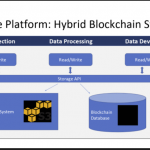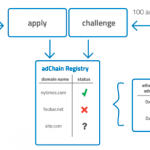Blockchain Is Valuable To Advertisers
Blockchain Is Valuable To Advertisers
by Dustin Engel , Op-Ed Contributor, September 20, 2017
Blockchain has suddenly become relevant, but many still don’t know what the future holds for this complex technology in our industry. As a recap, blockchain is essentially a ledger where each individual entry is linked to the previous and subsequent entry, creating a new layer of data security in an open framework.

The blockchain ledger is best known for its relation to the exchange of cryptocurrencies, such as Bitcoin and Ethereum.
Why is blockchain valuable to advertisers?
The potential success of blockchain is tied to smart contracts, which enable transactions to be added to the ledger if conditions are met. These smart contracts can be tied to compensation in the form of micropayments utilizing cryptocurrencies. They also require less logistics and middlemen for making payments.
Smart contracts have the powerful potential to open up and redefine performance marketing.
Today, performance is what can be seen by a system (say an ad server), which can be imperfect, incomplete or lack visibility into key elements.
For example, if one was willing to pay $50 for a new customer, then one would want to know: a) that it’s truly a new customer who might rely on back-office customer data, b) that another marketing touch point did not create that new customer which might lean on attribution data and c) that the value and profit likelihood of that new customer is worth paying that amount for, which might lean on collaborative filtering and customer scoring.
Then imagine a world where customers could be compensated directly for their trial of a product or service, or even their referral of the product or service.
Where does the opportunity lie?
Let’s say the goal is to create impressions that are above the fold, has a defined engagement, translate to a sale, and motivate the customer to be an active brand ambassador. In this case, you have to be willing to pay for each of these different criteria individually, at a differing rate and to multiple parties, including the consumer.
In today’ world, the criteria in this scenario is definable, but the transaction and compensation actions are challenging from a logistics and validation perspective. The entire process could be simpler if smart contracts were utilized.
The challenges that have the potential to be removed in the previous scenario are instantly removed when blockchain and smart contracts are incorporated into the payment method. The media impression goals shift to being media actions, because the concept of a smart contract is implemented.
The smart contract from a blockchain translates to a micro-payment with a publisher through an open exchange. The transaction is recorded in the blockchain. The micro-payment is made via a form of cryptocurrency.
How do we get there?
Before you get your heart set on blockchain becoming reality, there are some challenges that need to be worked out. The adoption process is critical.
Ideally, a startup needs to make enough of a dent in the market to either force a major player to acquire them or to build their own. But it must be care not to overly privatize or slow innovation. Fortunately, blockchain is a hot topic in enterprise IT as a means of transaction and data security — an indirect step to building familiarity and trust in blockchain.
MediaPost.com: Search Marketing Daily
(26)












